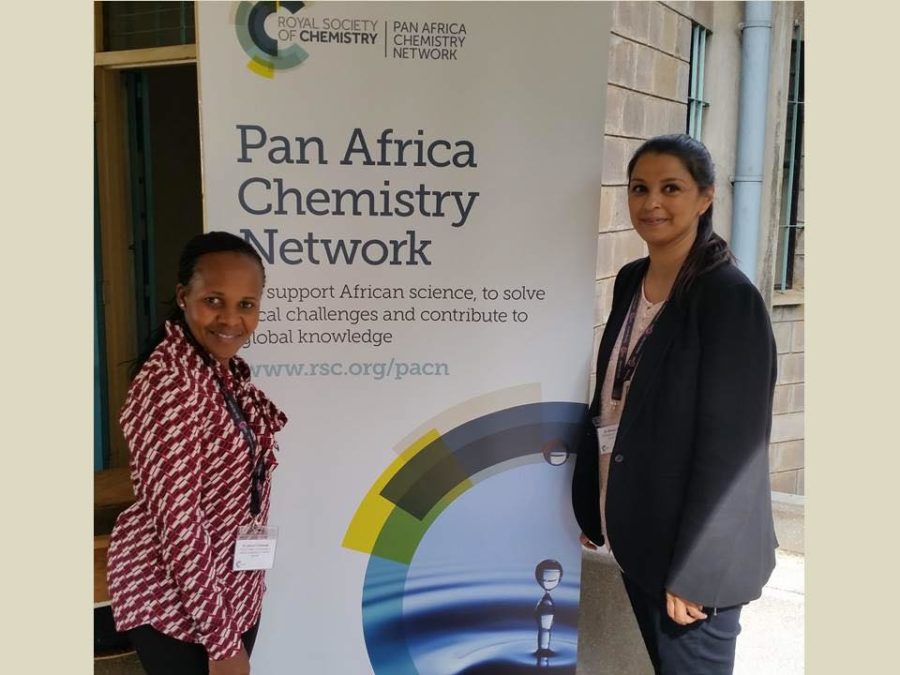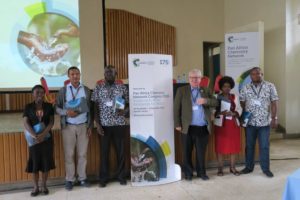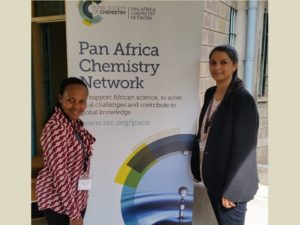23rd December 2016 Kenya
A Dialogue on Sustainable Water Resources for Africa at the Royal Society of Chemistry’s Annual Congress in Nairobi

Access to safe drinking water is fundamental to human development and well-being. It is also a fundamental human right, as recognised in 2010 by the United Nations General Assembly. Worldwide, over 663 million people still lack access to safe drinking water; nearly half of this population lives in sub-Saharan Africa (SSA). Science and innovation must play a vital role in devising solutions to this issue.
This year’s Royal Society of Chemistry’s, Pan Africa Chemistry Network (PACN) Congress focused on this crucial topic of water security and water safety, focussing on the role that chemical sciences play in tackling this daunting problem. The congress took place at the University of Nairobi, Kenya from November 30th to December 2nd. This was the 10th PACN congress that brought together over 250 participants from across Africa and the globe to discuss the current research, challenges and new developments.
The three-day event had a rich and packed agenda with presentations ranging from cutting edge chemistry on water quality, water and health, waste water treatment and policy discussions. Other researchers showcased their work through poster presentations and the best posters received awards presented by Professor Dominic Tildesley, Immediate Past President, Royal Society of Chemistry.

This year’s congress took place immediately after a successful training by the Royal Society of Chemistry on gas chromatography-mass spectrometry (GC-MS) in Lagos, Nigeria. The GC-MC training is supported by GlaxoSmithKline (GSK). The project manager for academic investments in Africa, Dr Sherif Hassane, presented a fascinating history of how the training started out of a passion for science when Professor Anthony Gachanja from Kenya and Dr Steve Lancaster, who first met as PhD students at the University of Hull, started a small GC-MS training programme in Nairobi in 2004, where budding analytical chemists travelled from across Africa to take part. Now with support from GSK, what began as a small scale, volunteer-led scheme in Kenya is being rolled out across other countries in Africa including Nigeria, Ghana and Ethiopia.
The annual PACN congress provides scientists an opportunity to engage, exchange ideas and build partnerships. One such achievement is the WaterSpoutt consortium, a partnership of researchers from across Europe, UK and Africa. The team told us how they met at a past PACN event and decided to collaborate in developing an innovative research project on solar water disinfection (SODIS) technologies, targeting remote and vulnerable communities in Sub-Saharan Africa. The project has received funding from European Union’s Horizon 2020 and they are currently piloting the technology in Uganda and South Africa.

The event also showcased UK’s excellence in science with inspiring talks and presentations delivered by leading UK Scientists including on the role of chemistry in addressing water quality and health challenges, utilising algae to clean up waste water and provide biofuel and food, and on decentralised ecological waste water treatment systems. These presentations ignited a lot of collaboration interests.
SIN-Africa also contributed in making the event a success through providing financial support to increase the participation of UK and regional scientists and I participated in the event, giving a talk on SIN and the Newton Fund which received an overwhelming response. It was a great opportunity to increase SIN’s visibility. I also assisted the organisers in inviting speakers to the event including UNEP’s Chief Scientist, Prof Jacqueline McGlade, who gave a lecture on water initiatives and research work that UNEP is supporting across the world.
This was a successful event and we look forward to seeing the partnerships and collaborations that emerge out of this forum.
Indeed poor water quality is a challenge in Sub – Saharan Africa. The SODIS technology is brilliant since is there is a sustainability aspect into it. It would be interesting to know how the project will target the remote and vulnerable communities in Sub-Saharan Africa. Will the project make a transformational change to the community?